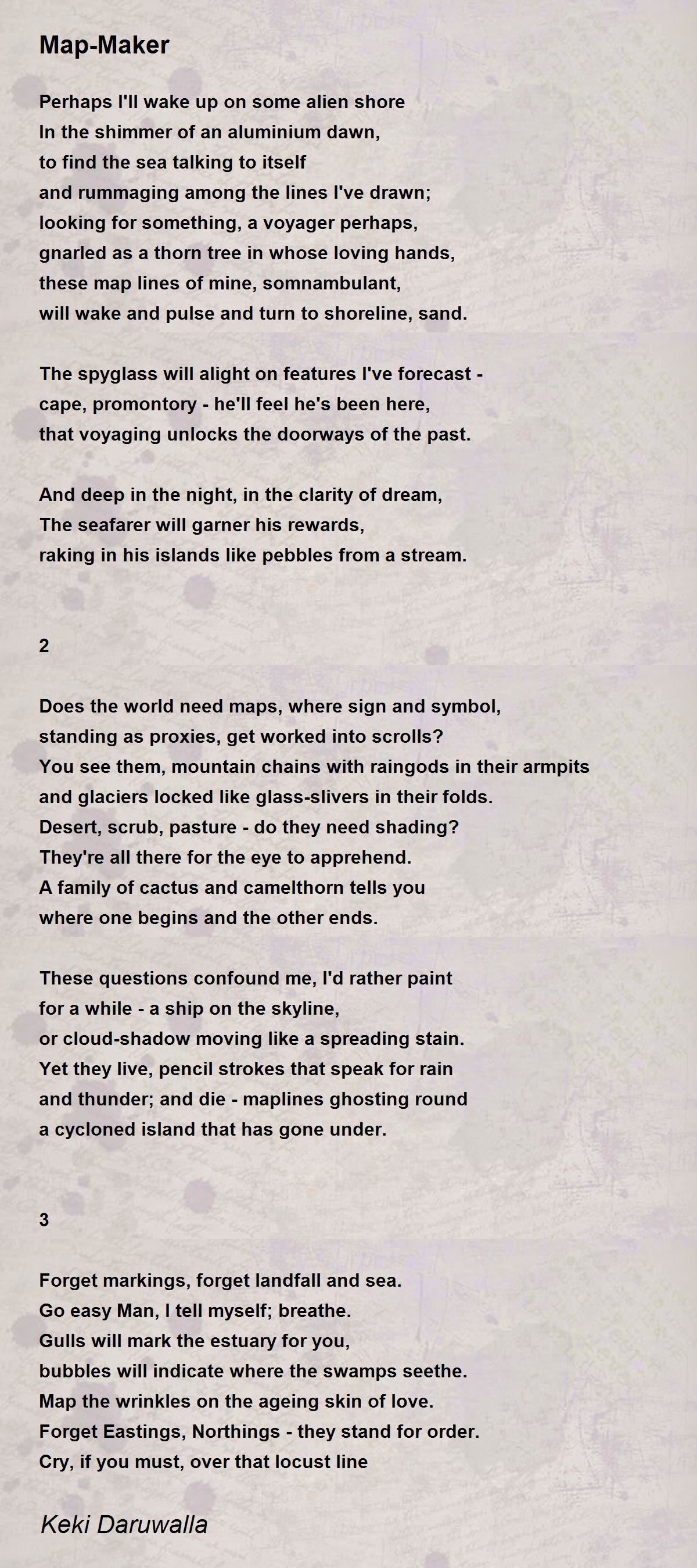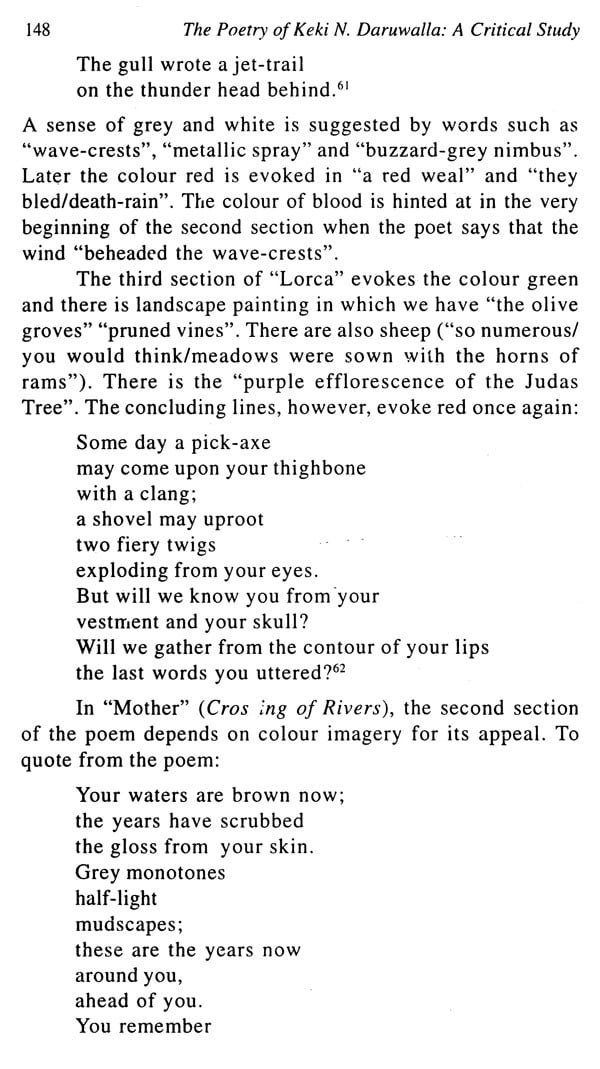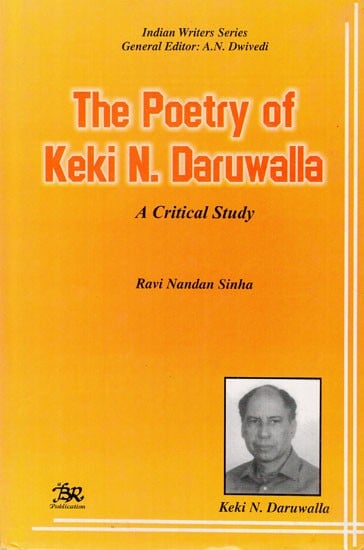"Map Maker" by Keki Daruwalla: A Journey Through Landscapes of Loss and Memory
Related Articles: "Map Maker" by Keki Daruwalla: A Journey Through Landscapes of Loss and Memory
Introduction
With great pleasure, we will explore the intriguing topic related to "Map Maker" by Keki Daruwalla: A Journey Through Landscapes of Loss and Memory. Let’s weave interesting information and offer fresh perspectives to the readers.
Table of Content
"Map Maker" by Keki Daruwalla: A Journey Through Landscapes of Loss and Memory

Keki N. Daruwalla, a prominent Indian poet, weaves a tapestry of profound emotions and evocative imagery in his collection of poems titled "Map Maker." Published in 1988, the work is a testament to Daruwalla’s unique ability to blend personal experiences with universal themes of loss, memory, and the human condition. Through his exploration of landscapes, both physical and internal, Daruwalla paints a vivid picture of a world grappling with the complexities of existence.
The Landscape of Loss and Memory:
The central motif of "Map Maker" is the intricate interplay between memory and loss. Daruwalla utilizes the metaphor of map-making to represent the process of reconstructing the past, piecing together fragments of experience to create a coherent narrative. However, this process is not without its challenges. The act of remembering is often intertwined with the pain of loss, and the map-maker must navigate through the treacherous terrain of grief and longing.
One of the most poignant poems in the collection, "The Map Maker," encapsulates this struggle:
"He mapped the world, a child, with stick and stone,
Each pebble a mountain, each grain of sand a sea.
He mapped the world, a man, with lines and scales,
Each river a memory, each desert a loss."
The poem highlights the evolution of the map-maker’s perspective. As a child, his maps were fueled by imagination, each element representing a world of wonder and possibility. However, as he matures, the maps become imbued with the weight of experience, reflecting the complexities of the world and the inevitable losses that accompany life. The "river" becomes a symbol of memory, flowing through the landscape of the past, while the "desert" signifies the emptiness left by loss.
Exploring Themes of Identity and Belonging:
Daruwalla’s exploration of loss extends beyond personal experiences, delving into the broader themes of identity and belonging. The collection reflects on the displacement and alienation experienced by individuals caught between cultures and traditions. The poet, himself a Parsi born in India, grapples with the complexities of navigating a world where his cultural heritage is often marginalized.
In poems like "The Exile," "The Immigrant," and "The Return," Daruwalla explores the emotional journey of those who have been forced to leave their homeland. The landscapes in these poems become metaphors for the internal struggles of the displaced, reflecting the longing for a sense of belonging and the constant search for identity in a foreign land.
A Poetic Language of Power and Vulnerability:
Daruwalla’s poetic language is characterized by its raw power and vulnerability. He utilizes a combination of vivid imagery, precise diction, and evocative metaphors to create a visceral experience for the reader. His poems are not merely descriptive; they are imbued with a deep sense of emotion that resonates on a visceral level.
One of the most striking aspects of Daruwalla’s style is his ability to juxtapose the harsh realities of life with moments of beauty and grace. The poems often oscillate between despair and hope, reflecting the complexities of the human experience. The poet does not shy away from confronting difficult themes, but he also finds moments of solace and redemption within the landscape of loss.
Beyond the Physical Landscape:
While the collection draws heavily on physical landscapes as metaphors for internal struggles, Daruwalla also explores the inner landscapes of the human mind. He delves into the depths of human consciousness, examining the complexities of memory, dreams, and the subconscious.
In poems like "The Dream," "The Night Journey," and "The Mirror," Daruwalla explores the surreal and often unsettling aspects of the human psyche. These poems offer a glimpse into the hidden depths of the mind, where the boundaries between reality and fantasy blur. Through these explorations, Daruwalla invites the reader to confront their own internal landscapes, their fears, and their desires.
The Significance of "Map Maker":
"Map Maker" is a powerful and moving collection of poems that speaks to the universal human experience of loss, memory, and the search for identity. Daruwalla’s ability to blend personal experiences with broader themes of displacement and alienation makes his work resonate with readers across cultures and backgrounds.
The collection’s significance lies in its ability to illuminate the complexities of the human condition, offering a nuanced perspective on the interplay between memory, loss, and the landscapes of both the physical and the internal world. Daruwalla’s poems challenge readers to confront their own experiences of loss, to grapple with the complexities of identity, and to appreciate the beauty and fragility of the human spirit.
FAQs about "Map Maker" by Keki Daruwalla:
1. What is the central theme of "Map Maker"?
The central theme of "Map Maker" is the intricate interplay between memory and loss. The act of making a map is used as a metaphor for the process of reconstructing the past, piecing together fragments of experience to create a coherent narrative. However, this process is often intertwined with the pain of loss, and the map-maker must navigate through the treacherous terrain of grief and longing.
2. How does Daruwalla use landscapes in his poems?
Daruwalla utilizes landscapes, both physical and internal, as metaphors for the human experience. Physical landscapes represent the external world, while internal landscapes reflect the complexities of the human mind. The poet often uses these landscapes to explore themes of displacement, alienation, and the search for identity.
3. What are some of the key motifs in "Map Maker"?
Key motifs in "Map Maker" include memory, loss, displacement, identity, belonging, and the search for meaning in a complex world. The collection also explores themes of the human psyche, dreams, and the subconscious.
4. What is Daruwalla’s poetic style like?
Daruwalla’s poetic style is characterized by its raw power and vulnerability. He utilizes vivid imagery, precise diction, and evocative metaphors to create a visceral experience for the reader. His poems often oscillate between despair and hope, reflecting the complexities of the human experience.
5. What is the significance of "Map Maker"?
"Map Maker" is a powerful and moving collection of poems that speaks to the universal human experience of loss, memory, and the search for identity. The collection’s significance lies in its ability to illuminate the complexities of the human condition, offering a nuanced perspective on the interplay between memory, loss, and the landscapes of both the physical and the internal world.
Tips for Reading "Map Maker":
- Pay attention to the imagery: Daruwalla’s poems are rich in imagery, and the landscapes he creates are central to the themes he explores. Pay close attention to the details of these landscapes and how they relate to the emotions and experiences of the poems.
- Consider the role of memory: Memory is a central theme in "Map Maker," and the poems often explore the ways in which memory shapes our understanding of the past and our present. Consider the different ways in which memory is portrayed in the poems and how it influences the characters and their journeys.
- Explore the themes of displacement and identity: The collection deals with the complexities of displacement and the search for identity, particularly for those who have been forced to leave their homeland. Consider the experiences of the characters and how they grapple with these themes.
- Engage with the emotional depth of the poems: Daruwalla’s poems are deeply emotional, and he does not shy away from confronting difficult themes. Allow yourself to experience the full range of emotions that the poems evoke.
Conclusion:
"Map Maker" is a collection of poems that transcends the boundaries of personal experience and delves into the heart of the human condition. Through its exploration of loss, memory, and the search for identity, the collection offers a profound and moving reflection on the complexities of existence. Daruwalla’s masterful use of language, imagery, and metaphor creates a powerful and unforgettable reading experience that leaves a lasting impression on the reader. The collection invites us to confront our own internal landscapes, to grapple with the challenges of loss and displacement, and to appreciate the resilience and beauty of the human spirit.








Closure
Thus, we hope this article has provided valuable insights into "Map Maker" by Keki Daruwalla: A Journey Through Landscapes of Loss and Memory. We thank you for taking the time to read this article. See you in our next article!